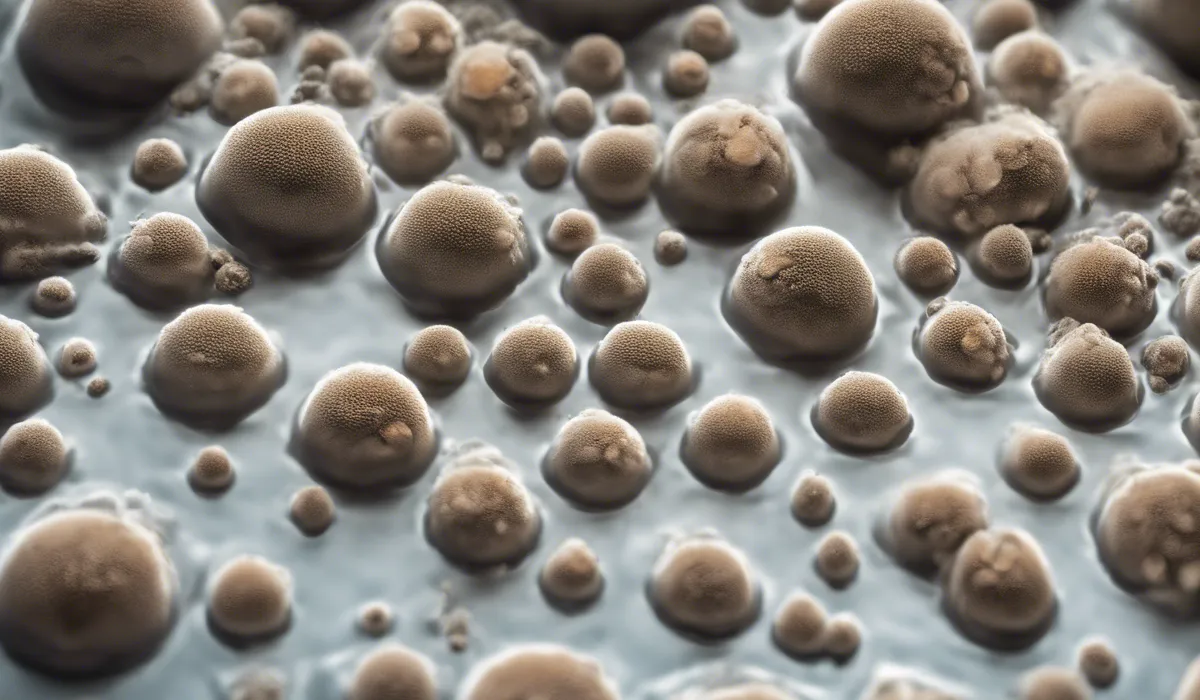Yes, mold can cause pneumonia, especially in individuals with weakened immune systems or chronic lung conditions. Certain molds produce mycotoxins that can lead to a specific type of pneumonia known as hypersensitivity pneumonitis if inhaled.
Understanding Mold and Its Health Implications

Definition and Types of Mold
Mold is a type of fungus that thrives in moist environments and reproduces through tiny spores that travel through the air.
There are thousands of mold species, but some common types include Aspergillus, Penicillium, and Stachybotrys, often known as black mold.
These tiny organisms play a crucial role in nature by breaking down dead organic matter. However, they can cause problems when they grow in our homes or workplaces.
Common Environments for Mold Growth
Mold loves damp and poorly ventilated spaces. Bathrooms, kitchens, basements, and areas around leaks in roofs or windows are prime spots for mold to flourish.
High humidity levels, especially above 60 percent, also encourage mold growth.
Materials like wood, paper, carpet, and insulation provide suitable food sources for mold when combined with moisture.
How Mold Exposure Occurs?
People get exposed to mold by breathing in spores or touching moldy surfaces. Mold exposure can also happen when eating food that has mold on it.
Since mold spores are very small and can easily float through the air, they can enter homes through windows, doors, or even hitch a ride on clothing or pets.
Overview of Health Issues Related to Mold Exposure
Exposure to mold can lead to various health issues like sneezing, coughing, and itchy eyes, especially for people with allergies.
Some individuals might experience skin rashes or a stuffy nose. In more severe cases, mold can worsen asthma symptoms or lead to more serious respiratory problems.
The Body’s Immune Response to Mold
When mold spores are inhaled, the body’s immune system kicks into action to fight them off, just like it would with other foreign invaders.
For most people, this means temporary discomfort. But for those with weakened immune systems, such as the elderly or those with chronic illnesses, the body might struggle to defend itself, leading to more severe health issues.
The Link Between Mold and Respiratory Conditions

General Respiratory Effects of Mold Exposure
Mold exposure can irritate the airways, causing symptoms like coughing, wheezing, and shortness of breath.
People with asthma may find their condition exacerbated by mold, as it can trigger asthma attacks and increase the frequency of symptoms.
Specific Respiratory Infections Linked to Mold
Certain molds can cause infections in the lungs. For example, Aspergillus can lead to aspergillosis, a condition that can be quite serious for people with compromised immune systems or lung diseases.
Examining the Evidence: Can Mold Cause Pneumonia?
While typical molds found in homes do not directly cause pneumonia, they can contribute to conditions that may lead to pneumonia-like symptoms, particularly in susceptible individuals.
Hypersensitivity pneumonitis, an inflammatory condition of the lungs, can develop after prolonged exposure to mold spores.
This condition resembles pneumonia and requires medical attention.
Prevention and Remediation Strategies

for Preventing Mold Growth in Homes and Buildings
Keeping indoor humidity levels low, ensuring proper ventilation, fixing leaks promptly, and using mold-resistant building materials can help prevent mold growth.
Regularly cleaning and drying damp areas also reduces the likelihood of mold taking hold in your home.
Measures to Take if Mold is Found
If you find mold in your home, it’s essential to clean it up promptly and fix the source of the moisture.
For small areas, you can use soap and water or a mixture of bleach and water to clean the mold. For larger infestations or if the mold is in a HVAC system, it’s best to hire a professional.
Treatment Options for Mold-Related Health Conditions
If you have health issues that you think are caused by mold, seeing a doctor is important. Treatments might include medications to reduce inflammation and allergy symptoms, nasal sprays, or even antifungal drugs for more serious infections.
When to Seek Medical Attention for Mold Exposure?
If you experience persistent symptoms such as coughing, wheezing, or difficulty breathing after being exposed to mold, or if you have a condition that weakens your immune system, seek medical help.
It’s better to be cautious and get checked out by a healthcare provider to ensure your symptoms are not the beginning of a more serious condition.
FAQs About Mold and Pneumonia
Can inhaling mold cause pneumonia?
Yes, inhaling certain molds can lead to a type of pneumonia known as hypersensitivity pneumonitis, particularly in those with compromised immune systems or existing lung conditions.
Is mold-related pneumonia different from typical pneumonia?
Yes, mold-related pneumonia, like hypersensitivity pneumonitis, is an allergic reaction to inhaled mold spores, which is different from typical bacterial or viral pneumonia.
What are the symptoms of mold-induced pneumonia?
Symptoms can include cough, shortness of breath, chest tightness, and fatigue, which are similar to other types of pneumonia.
Who is most at risk for pneumonia caused by mold?
Individuals with weakened immune systems, chronic lung diseases, or allergies to mold are at a higher risk for developing pneumonia caused by mold exposure.
How can I prevent mold-related pneumonia?
Prevent mold growth in your environment by controlling humidity levels, fixing leaks, and ensuring proper ventilation to reduce the risk of mold-related pneumonia.
Final Thoughts
Mold exposure can indeed precipitate pneumonia, with those having compromised immune systems or existing pulmonary diseases being particularly susceptible.
The inhalation of mycotoxins from certain molds is known to cause hypersensitivity pneumonitis, a specific form of pneumonia, highlighting the importance of addressing mold growth in living and working environments for respiratory health.
